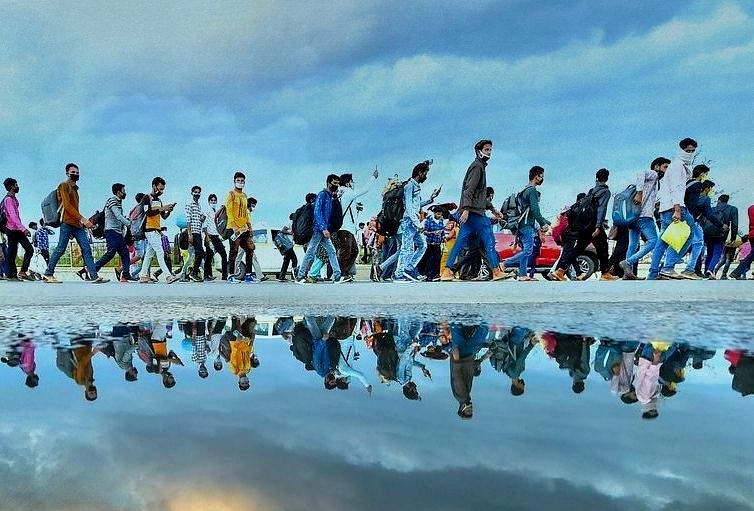Economy
Relief Package For Migrants: Why The Government Chose To Provide Food Grains Instead Of Cash Transfer
- There was a call for a cash transfer-based policy but the government provided migrant workers with food grains.
- This move is important as nearly 60 per cent or more of the consumption expenditure of the poor goes into food consumption.

Migrant workers walk to their native villages after the announcement of nationwide lockdown.
A key question that everyone has is regarding the impact of various provisions of the announcements being made by Finance Minister Nirmala Sitharaman. The second series of announcements focus on the bottom of the pyramid, especially by providing support to the migrant workers.
This is one of those times when there is limited data available to map what is happening in the economy, especially as we don’t know whether people have witnessed a drastic rundown of savings due to the pandemic as non-essential sectors are shut.
Therefore, there is no way we can either deny or state the presence of a severe income stress.
There is anecdotal evidence of the same but we don’t have data to support either of the hypothesis.
This makes it difficult to gauge the extent of income stress that the bottom one third of the population (which is generally either poor or vulnerable to falling into poverty).
There was a call for a cash transfer-based policy using the direct benefit transfer to help these people by providing them with direct money in their bank accounts.
In contrast, the government has provided them with food grains irrespective of whether they are ration card holders or not. This move is important as nearly 60 per cent or more of the consumption expenditure of the poor goes into food consumption.
The rich on the other hand spend relatively less on their food and related expenses.
In the present situation, these migrant workers don’t have any income and therefore, they have small savings which are not sufficient to provide them with enough to consume.
In the past, I have advocated cash transfers as an alternative policy measure to our existing subsides.
A joint paper with Dr Surjit S Bhalla outlined the same which can be accessed by clicking here.
However, the present situation requires us to understand that the government could not have covered the income loss of the migrants.
A small cash transfer of say Rs 500 per month could not have covered the entire expenditure for food while targeting migrants through cash transfers would have been another challenge.
Moreover, a lot of them are on the move at the moment and there is an unprecedented reverse migration that has taken place – the long-term impact of which is difficult to predict at the moment.
Providing food grains at such a point makes sense as it leverages on the existing public distribution system (PDS) infrastructure of state governments and to do so universally is a move that should address some of the severe consumption stress that has hit the poorer sections of population.
That being said, ultimately, the onus for ensuring that these individuals don’t slip back into poverty would be to ensure that we can protect jobs and experience a quick economic recovery.
It is difficult to give a fair assessment of the package without the complete package being announced and even though the analytical approach by the government is correct, however, a key component is of economic expectations.
More than the actual impact of policies, it is the economic expectations that matter as they drive animal spirits or entrepreneurial spirits.
At the moment, these spirits are down and simultaneously, consumer confidence too is down.
While they have been slightly uplifted by the series of announcements over the last three days, we will have to wait until Monday to get a fair sense of the extent of impact of the measures that have been announced by the government.
Introducing ElectionsHQ + 50 Ground Reports Project
The 2024 elections might seem easy to guess, but there are some important questions that shouldn't be missed.
Do freebies still sway voters? Do people prioritise infrastructure when voting? How will Punjab vote?
The answers to these questions provide great insights into where we, as a country, are headed in the years to come.
Swarajya is starting a project with an aim to do 50 solid ground stories and a smart commentary service on WhatsApp, a one-of-a-kind. We'd love your support during this election season.
Click below to contribute.
Latest